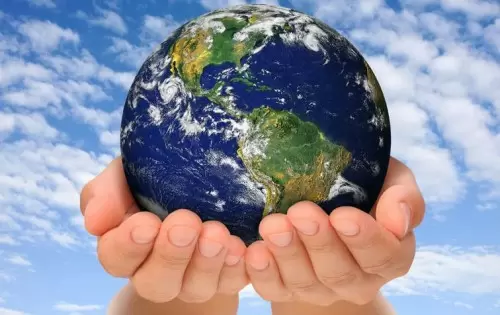As the state closest to the Great Pacific Garbage patch, here in Hawaii we have some fully justified concerns about the state of the global environment today. The local environment is threatened not only by drifting garbage, but also our acclaimed status as a global tourist destination, which brings in millions more people each year than the fragile local ecosystems can naturally support. Almost half of the freshwater consumption on the Big Island is due to tourism, consuming a precious and limited resource.
In other ways, our status as a distant tropical paradise has worked in favor of our environment. The geographic isolation enforced by that distance has also made the islands the perfect lab for ecological studies. Many major species endemic to the islands are found nowhere else on earth, opening up unique research opportunities here.
Naturally, oceanography is king among the environmental sciences here. Despite being the 8th smallest state geographically, we have the 4th longest oceanic coastline.
But we've got some pretty interesting topography inland, too, with Mauna Kea approaching 14,000 feet and offering an alpine biome that is nearly unique in Oceania. Oh, and the most active volcano in the United States in Mount Kilauea.
With so many diverse and unique research options and a lifestyle to die for, it all comes together to make Hawaii the perfect place to earn your degree in environmental science.
What Can I Do with an Environmental Science Degree in Hawaii
The state itself is a big employer of environmental scientists here. Because we're a series of islands, each is a closed loop for land-based resources and pollution. It requires a lot of monitoring and coordination to keep the islands in balance.
We also have a lot of non-profits dedicated to the study and preservation of our unique environment. The Nature Conservancy, Sustainable Coastlines, and other local and national non-profit organizations are doing their part to keep Hawaii magnificent, and they could use your help.
Finally, both the federal government and government contractors offer plenty of job opportunities. Plastics research and control, marine biology, and various military reservation cleanup and mitigation projects require a steady stream of environmental science talent.
It brings in good money as well… according to the Bureau of Labor Statistics, the average environmental scientist in Hawaii brings home just over $70,000 annually. Others do even better; hydrologists, geoscientists, and atmospheric scientists all pull in something north of $100,000.
2020 US Bureau of Labor Statistics salary figures and job growth projections for the professions listed reflect state data not school-specific information. Conditions in your area may vary. Data accessed September 2021.
Master's in Environmental Science in Hawaii
The University of Hawaii system is the big kahuna when it comes to environmental studies in the state. UH Manoa, in Honolulu, offers master's degrees in marine biology, oceanography, entomology, and environmental management alongside even more specialized degrees in tropic plant and soil science and tropical plant pathologies.
Over on the Big Island, you have yet another excellent program in the UH-Hilo Master of Science in Tropical Conservation Biology and Environmental Science, which uses the extraordinary biological, physical, and cultural complexity of the island of Hawaii as as focus of study and training.
Bachelor's in Environmental Science in Hawaii
The University of Hawaii naturally delivers bachelor's degrees that are equal to the task of prepping you for their master's programs, but you also have other options at the undergraduate level.
On Oahu, for example, the private nonprofit Hawaii Pacific University offers environmental studies degrees as either a bachelor of arts or a bachelor of science, depending on whether your focus is the policy and management side of the shop or the more technical aspects of environmental science. Either option is excellent, drawing students from all over the world, and taking advantage of the island's unique Mid-Pacific location to undertake studies and examine questions you could never investigate anywhere else in the world.







